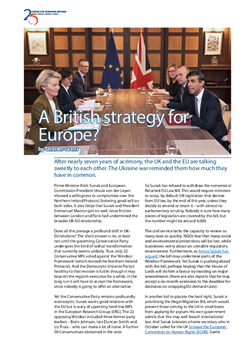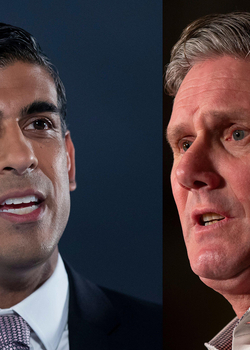
A British strategy for Europe?
After nearly seven years of acrimony, the UK and the EU are talking sweetly to each other. The Ukraine war reminded them how much they have in common.
Prime Minister Rishi Sunak and European Commission President Ursula von der Leyen showed a willingness to compromise over the Northern Ireland Protocol, fostering good will on both sides. It also helps that Sunak and President Emmanuel Macron get on well, since friction between London and Paris had undermined the broader UK-EU relationship.
Does all this presage a profound shift in UK-EU relations? The short answer is no, at least not until the governing Conservative Party undergoes the kind of radical transformation that currently seems unlikely. True, only 22 Conservative MPs voted against the ‘Windsor Framework’ (which revised the Northern Ireland Protocol). And the Democratic Unionist Party’s hostility to that revision is futile: though it may boycott the region’s executive for a while, in the long run it will have to accept the framework, since nobody is going to offer an alternative.
Yet the Conservative Party remains profoundly eurosceptic. Sunak wants good relations with the EU but is wary of upsetting hard-line MPs in the European Research Group (ERG). The 22 opposing Windsor included three former party leaders – Boris Johnson, Iain Duncan-Smith and Liz Truss – who can make a lot of noise. A further 50 Conservatives abstained in the vote.
The Conservative Party remains profoundly eurosceptic. Sunak wants good relations with the EU but is wary of upsetting hard-line MPs in the European Research Group.
So Sunak has refused to withdraw the nonsensical Retained EU Law Bill. This would require ministers to scrap, by default, UK legislation that derives from EU law, by the end of this year, unless they decide to amend or retain it – with almost no parliamentary scrutiny. Nobody is sure how many pieces of legislation are covered by the bill, but the number might be around 4,000.
The civil service lacks the capacity to review so many laws so quickly. NGOs fear that many social and environmental protections will be lost, while businesses worry about an unstable regulatory environment. Furthermore, as Anton Spisak has argued, the bill may undermine parts of the Windsor Framework. Yet Sunak is pushing ahead with the bill, perhaps hoping that the House of Lords will do him a favour by insisting on major amendments (there are also reports that he may accept a six-month extension to the deadline for decisions on scrapping EU-derived rules).
In another bid to placate the hard right, Sunak is prioritising the Illegal Migration Bill, which would prevent those coming to the UK in small boats from applying for asylum. His own government admits that this may well breach international law. And Sunak tolerates a home secretary who in October called for the UK to leave the European Convention on Human Rights (ECHR). Suella Braverman was apparently unaware that Britain’s participation in the ECHR is an integral part of both the Good Friday Agreement and the justice and home affairs provisions of the Trade and Co-operation Agreement between the UK and the EU.
Despite these clouds, the warmer cross-Channel weather should produce some benefits. There may be an accord between financial market regulators, easier trading of electricity across the Channel, and British re-entry to the Horizon programme of scientific research – the EU had blocked all three because of the protocol. But Sunak is hesitating over Horizon, worrying about whether it is value for money.
A more fundamental rapprochement will probably have to await the arrival of a Labour government, which opinion polls suggest is likely after the next election (which must be held by January 2025). Keir Starmer, the Labour leader, and his chief lieutenants are instinctively pro-European. He does not have to worry about anything like the ERG. Starmer is nevertheless cautious on Europe, believing that he will not win back ‘red wall’ seats in the north of England and the Midlands if he appears too pro-EU.
Keir Starmer, the Labour leader, and his chief lieutenants are instinctively pro-European. He does not have to worry about anything like the European Research Group.
Starmer has made it clear that a Labour government would not seek to rejoin the single market or the customs union, or restore free movement with the EU. What he would do is recognise EU standards on plant and animal health, to reduce friction at borders; seek a deal on mobility, so that Britons could work for short periods in the EU without a visa, and vice versa; and negotiate structural ties on foreign and defence policy that would plug the British into the EU’s machinery. The EU would welcome these moves – though none of them would do a great deal to undo the damage that Brexit has inflicted on the UK economy.
In the longer run, perhaps in a second term, a Starmer government might be bolder about rebuilding ties with the EU. This would be easiest in predominantly ‘inter-governmental’ areas such as foreign, defence and security policy, where the role of EU law is sometimes minimal. The difficulty with closer economic ties is that many EU governments – and the Commission in particular – strongly believe in the ‘integrity’ of the single market, meaning that third countries should not be allowed to cherry-pick access to parts of it; the market comes as a package, including free movement of people. And if one country, like Britain, were allowed an exception, others would ask for the same and before long the market would unravel. So a Labour government would find it hard to improve the fundamentals of the economic relationship.
But if the UK adopted a serious and constructive long-term strategy, the EU might at some point see the potential benefits of a more intimate relationship. The evolution of the EU’s thinking on enlargement – it talks of giving neighbours access to parts of the single market before they become full members – could help. A Labour government should:
- Make sure ministers treat the EU and its members with courtesy. Avoid provocations and hubristic talk of Britain having ‘world-beating’ this, that or the other. Politeness and modesty would help to generate good will towards the UK. So would offers to help with, for example, supplies of energy or defence equipment, without insisting on something in return.
- Prioritise plugging the information deficit vis-à-vis the EU. Because ministers and officials no longer turn up to meetings in Brussels, there is growing ignorance in the UK about how the EU works. Set up a new unit to monitor EU legislation, so that the government can take a view on whether it wishes to align with EU rules, and tap into the knowledge held outside government, for example in businesses and think-tanks.
- Strengthen bilateral relations with the member-states, and not just the big ones. Even when the UK was a member it paid insufficient attention to some of the smaller members, thereby forgoing influence. Nor should the UK shun the EU’s institutions. Many Conservatives are ideologically hostile to engaging with Brussels, but the Commission, the European External Action Service and the Parliament matter, even when one is outside the EU.
- The UK will be a more appealing partner for the EU if its economy performs better. Despite the damage inflicted by Brexit, much could be done to improve performance (as John Springford writes in this bulletin). Similarly, the UK needs to enhance its diplomatic influence, building ties with middle-sized countries on other continents. But (as Ian Bond points out in this bulletin) that influence is impaired by the under-funding of British diplomacy, defence and development aid. A well-connected Britain, with a stronger economy and the capacity to make a big contribution to European security would be an attractive neighbour – and maybe one with which the EU would wish to forge a bespoke partnership.
Charles Grant is director of the Centre for European Reform.



